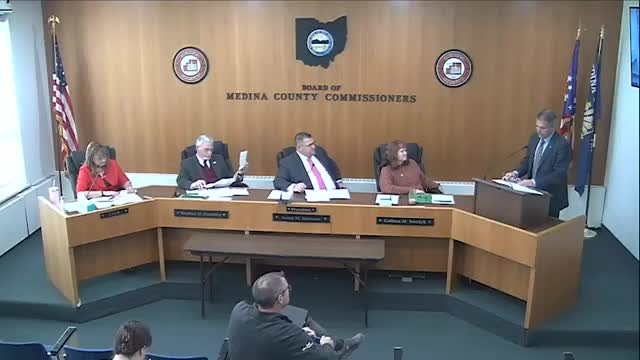Medina County commissioners debate one-year homestead "piggyback" as schools warn of lost revenue
Get AI-powered insights, summaries, and transcripts
Subscribe
Summary
Medina County commissioners discussed a proposed one-year expansion of the state homestead exemption to deliver property-tax relief to senior, disabled and veteran households.
Medina County commissioners discussed a proposed one-year expansion of the state homestead exemption during the meeting, a step county staff said would deliver targeted property-tax relief to senior, disabled and veteran households.
Wadsworth City Schools Superintendent Andy Hill told commissioners his board passed a resolution opposing the piggyback “right now as we wait to see what actually does happen at the state level,” saying the district faces a multi-million dollar projected deficit and that the change would remove roughly $555,000 annually from the district’s inside-millage revenue.
Why it matters: Commissioners said the short-term piggyback is the most direct way they were offered to put cash back in the hands of residents on fixed incomes, but school and other taxing districts would absorb much of the revenue loss. County staff and witnesses repeatedly framed the measure as a one-year, temporary option designed to deliver immediate relief while state lawmakers work on longer-term reform.
Key facts and figures presented at the meeting: Wadsworth officials told the board they are projecting nearly $7 million in deficits over coming years under current assumptions and that the district has already reduced staff through attrition. County staff estimated the piggyback option would deliver about $5.5 million in tax relief across Medina County and that more than 1,500 senior, veteran and disabled households in the Wadsworth area could be eligible for the temporary relief.
School officials urged caution about acting locally before state action is clear. Hill said the board’s opposition reflects timing and the potential for “a double impact” if Columbus acts retroactively or with additional changes. Doug Beaman, Wadsworth treasurer, provided the district’s updated financial forecast and answered commissioners’ questions about the district’s reliance on inside millage growth versus outside levies.
Commissioners said they are weighing trade-offs among county departments and other local taxing entities, noting that some districts (for example, vocational schools) have different statutory “floors” on millage and that parks, township fire districts and other bodies could face net losses without compensating offsets. Auditor staff explained that many taxing units do not have the 20-mill floor that cushions school districts and that the distribution effects vary by taxing authority.
No final county vote on the piggyback occurred at the meeting. Commissioners continued to gather input from local school districts and other affected entities before taking formal action; the board later recessed into executive session on a separate personnel matter.
What officials said: - Andy Hill, superintendent, Wadsworth City Schools: “The board passed a resolution…that’s in opposition of that piggyback right now as we wait to see what actually does happen at the state level.” - County staff: countywide relief from the measure was described repeatedly in meeting materials and discussion as “about $5.5 million.”
Context and next steps: Commissioners said the homestead piggyback would be temporary (presented as a one-year measure) while the legislature and executive branch consider broader tax reforms. Officials also noted related development and tax incentive questions—such as the structure of a proposed TIF and whether PILOTs (payments in lieu of taxes) would offset residential impacts—remain unresolved and are under separate review.
The board did not adopt any ordinance or resolution on property-tax piggyback at the meeting; commissioners encouraged continued conversation with school districts, the auditor’s office and other affected taxing units before any formal vote.
